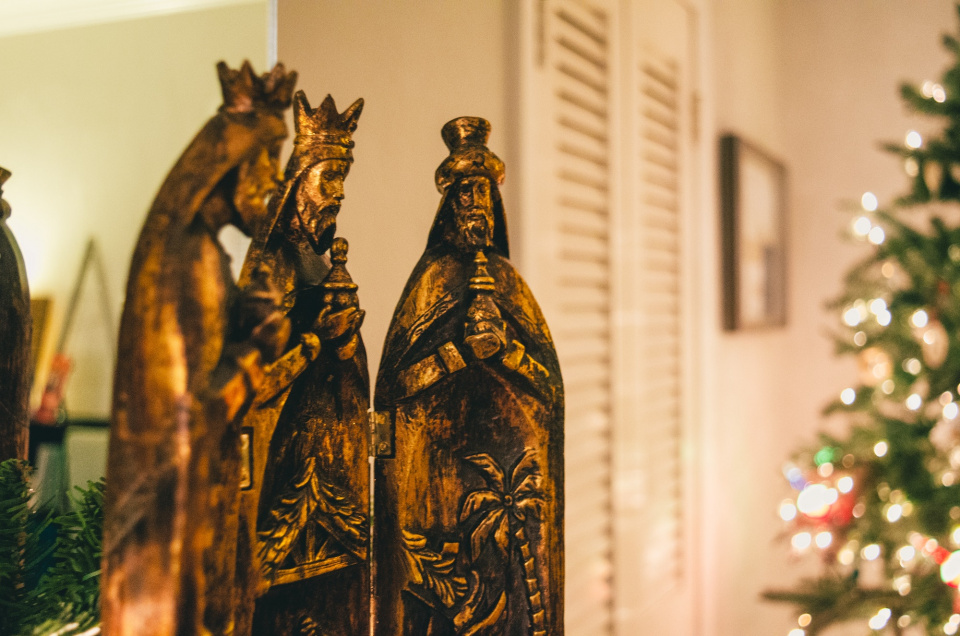The Sunday Project

Venite Adoremus
The Epiphany of the Lord |
By Stephen Eugene Pollmann

Rise up in splendor, Jerusalem! Your light has come, the glory of the Lord shines upon you. See, darkness covers the earth, and thick clouds cover the peoples; but upon you the LORD shines, and over you appears his glory. Nations shall walk by your light, and kings by your shining radiance. Raise your eyes and look about; they all gather and come to you: your sons come from afar, and your daughters in the arms of their nurses.
Then you shall be radiant at what you see, your heart shall throb and overflow, for the riches of the sea shall be emptied out before you, the wealth of nations shall be brought to you. Caravans of camels shall fill you, dromedaries from Midian and Ephah; all from Sheba shall come bearing gold and frankincense, and proclaiming the praises of the LORD.
Brothers and sisters: You have heard of the stewardship of God’s grace that was given to me for your benefit, namely, that the mystery was made known to me by revelation. It was not made known to people in other generations as it has now been revealed to his holy apostles and prophets by the Spirit: that the Gentiles are coheirs, members of the same body, and copartners in the promise in Christ Jesus through the gospel.
When Jesus was born in Bethlehem of Judea, in the days of King Herod, behold, magi from the east arrived in Jerusalem, saying, “Where is the newborn king of the Jews? We saw his star at its rising and have come to do him homage.” When King Herod heard this, he was greatly troubled, and all Jerusalem with him. Assembling all the chief priests and the scribes of the people, He inquired of them where the Christ was to be born. They said to him, “In Bethlehem of Judea, for thus it has been written through the prophet: And you, Bethlehem, land of Judah, are by no means least among the rulers of Judah; since from you shall come a ruler, who is to shepherd my people Israel.” Then Herod called the magi secretly and ascertained from them the time of the star’s appearance. He sent them to Bethlehem and said, “Go and search diligently for the child. When you have found him, bring me word, that I too may go and do him homage.” After their audience with the king they set out. And behold, the star that they had seen at its rising preceded them, until it came and stopped over the place where the child was. They were overjoyed at seeing the star, and on entering the house they saw the child with Mary his mother. They prostrated themselves and did him homage. Then they opened their treasures and offered him gifts of gold, frankincense, and myrrh. And having been warned in a dream not to return to Herod, they departed for their country by another way.
A guiding star, the fulfillment of joyful anticipation, and a community gathering in celebration: just over a week ago, we celebrated Christmas, and today we observe the Epiphany — honoring the Adoration of the Magi and the manifestation of Christ to the Gentiles. While still in the liturgical season of Christmas, when many of us travel back to our hometowns and birthplaces in a pseudo-commemoration of the Holy Family’s journey to Bethlehem, the Epiphany gives us a model for our modern celebrations and reminds us of the deep, spiritual gifts we receive when we are in communion with Jesus and one another.
In the gospel, we read about the magi and their profound experience of joy upon encountering the infant Jesus. As Catholics living in the 21st century, many of us experience this same extraordinary joy and fulfillment upon encountering Christ in the Eucharist. However, as queer Catholics, we are often discouraged from fully encountering the person of Christ, and rituals involving loved ones may often feel inaccessible when family and a sense of community are either scarce or seemingly nowhere to be found. When others are gathering in hometown churches with family and friends, it’s all too common for members of our community to endure feelings of spiritual darkness or loneliness that tend to sting more keenly this time of year.
Yet, as Isiah’s prophecy foretold of a light being offered to a people in darkness, so too do the events of the Epiphany offer a brilliant example of hope for us queer Catholics and many other marginalized groups. Not absent from the story of the Epiphany is the looming threat of King Herod and his intentions to extinguish hope and prevent the realization of Isaiah’s prophecy. Nevertheless, the events of the Epiphany are not driven by the fears and suspicions of a distant authority figure, but are instead determined by a small community united in their pursuit of the love of God. The congregation described in Matthew’s gospel is humble, consisting of the infant Jesus, Mary and the three magi (though presumably Joseph, patriarch of the Holy Family, is either nearby or perhaps just stepped out for some fresh air) yet through their shared adoration in the real presence of Christ, this group achieves something remarkable, simultaneously evading an ancient political threat and establishing what is likely the very earliest Christian community.
As queer Catholics, we too experience political threats that often seek to extinguish our hopes or separate us from the person of Christ. Thankfully, the Epiphany gives us a blueprint for overcoming these threats, along with any individual spiritual darkness: when we allow ourselves to be guided by the light that is the love of God, we will always find our way to Him and to each other, thereby simultaneously receiving and giving the gift of community which strengthens us and enriches our lives more than gold or frankincense ever could.